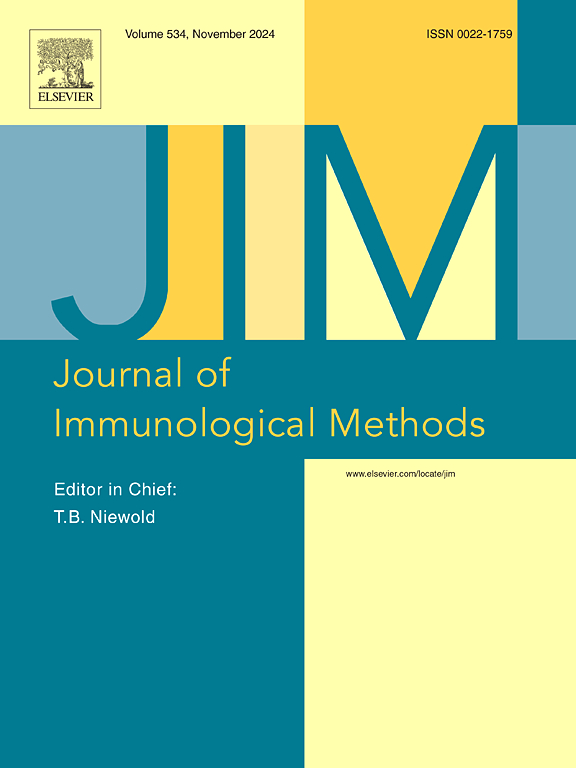用高通量酶联免疫吸附试验和表面等离子体共振鉴定多反应性抗体。
IF 1.6
4区 医学
Q4 BIOCHEMICAL RESEARCH METHODS
引用次数: 0
摘要
多反应性的评估通常通过酶联免疫吸附试验(ELISA)进行,使用具有不同生化特性(包括带电性和疏水性)的生物化学多样性靶抗原,包括蛋白质、碳水化合物、核酸和脂质,其中一些本质上是异质性的。在这里,我们探索了基于确定分子量探针的多反应性elisa,我们也能够直接过渡到使用表面等离子体共振(SPR)的多反应性测定。使用一组先前表征的临床抗体,我们获得的结果与先前的多反应性研究一致,但在早期发现过程中具有高通量分析的潜力。我们发现ELISA对抗体的多反应性检测更为敏感,但与SPR相比,其吞吐量可能较低,但可能缺乏SPR的线性灵敏度。本文章由计算机程序翻译,如有差异,请以英文原文为准。
Identification of polyreactive antibodies by high throughput enzyme-linked immunosorbent assay and surface Plasmon resonance
The assessment of polyreactivity is usually carried out by enzyme linked immunosorbent assay (ELISA) using biochemically diverse target antigens with different biochemical properties, including charge and hydrophobicity, and comprising proteins, carbohydrates, nucleic acids and lipids, some of which are heterogenous in nature. Here we explored polyreactivity ELISAs based on probes of defined molecular weight, which we were also able to directly transition to a polyreactivity assay using surface plasmon resonance (SPR). Using a panel of previously characterized clinical antibodies we obtain results compatible with previous polyreactivity studies, but with potential for high throughput analysis following kinetic measurements in the early discovery process. We find ELISA is more sensitive for the detection of polyreactivity in antibodies, and with potential lower throughput, compared to SPR, but may lack the linear sensitivity of SPR.
求助全文
通过发布文献求助,成功后即可免费获取论文全文。
去求助
来源期刊
CiteScore
4.10
自引率
0.00%
发文量
120
审稿时长
3 months
期刊介绍:
The Journal of Immunological Methods is devoted to covering techniques for: (1) Quantitating and detecting antibodies and/or antigens. (2) Purifying immunoglobulins, lymphokines and other molecules of the immune system. (3) Isolating antigens and other substances important in immunological processes. (4) Labelling antigens and antibodies. (5) Localizing antigens and/or antibodies in tissues and cells. (6) Detecting, and fractionating immunocompetent cells. (7) Assaying for cellular immunity. (8) Documenting cell-cell interactions. (9) Initiating immunity and unresponsiveness. (10) Transplanting tissues. (11) Studying items closely related to immunity such as complement, reticuloendothelial system and others. (12) Molecular techniques for studying immune cells and their receptors. (13) Imaging of the immune system. (14) Methods for production or their fragments in eukaryotic and prokaryotic cells.
In addition the journal will publish articles on novel methods for analysing the organization, structure and expression of genes for immunologically important molecules such as immunoglobulins, T cell receptors and accessory molecules involved in antigen recognition, processing and presentation. Submitted full length manuscripts should describe new methods of broad applicability to immunology and not simply the application of an established method to a particular substance - although papers describing such applications may be considered for publication as a short Technical Note. Review articles will also be published by the Journal of Immunological Methods. In general these manuscripts are by solicitation however anyone interested in submitting a review can contact the Reviews Editor and provide an outline of the proposed review.

 求助内容:
求助内容: 应助结果提醒方式:
应助结果提醒方式:


